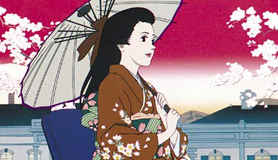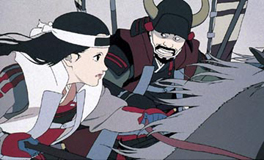|
Newest Reviews:
New Movies -
The Tunnel
V/H/S
The Tall Man
Mama Africa
Detention
Brake
Ted
Tomboy
Brownian Movement
Last Ride
[Rec]³: Genesis
Hara-Kiri: Death of a Samurai
Indie Game: The Movie
Abraham Lincoln: Vampire Hunter
Old Movies -
Touki Bouki: The Journey of the Hyena
Drums Along the Mohawk
The Chase
The Heiress
Show
People
The Strange Affair of Uncle Harry
Pitfall
Driftwood
Miracle Mile
The Great Flamarion
Dark Habits
Archives -
Recap: 2000,
2001, 2002,
2003, 2004
, 2005, 2006,
2007 , 2008
, 2009 ,
2010 , 2011 ,
2012
All reviews alphabetically
All reviews by star rating
All reviews by release year
Masterpieces
Screening Log
Links
FAQ
E-mail me
HOME
| |
Millennium Actress (Satoshi Kon, 2001)
 A tepidly conceived ride through the psyche of an aging actress, Perfect
Blue director Satoshi Kon’s Millennium
Actress would deserve credit for being more thematically ambitious than the
average animated film if it incorporated those themes with any aplomb. Set in
the present day, the movie opens as a documentarian and his cameraman travel to
the home of reclusive actress Chiyoko Fujiwara, whose life has more or less
mirrored the tumultuous trajectory of the Japanese sound cinema. As the two
filmmakers begin to interview the actress, they find themselves so captivated by
her telling of her past that they seem to be cast into active roles in her
memories and film roles. At times, it appears that the film is commenting on our
active role as spectators of cinema, but as the movie continues, and reveals its
perception of Chiyoko’s life to be one extended chase scene, it becomes
apparent that it’s not very engaged with any such concepts. As it searches for
a consistent thread throughout the roles that Chiyoko has played, it ends up
simply making her life’s work seem trite.
A tepidly conceived ride through the psyche of an aging actress, Perfect
Blue director Satoshi Kon’s Millennium
Actress would deserve credit for being more thematically ambitious than the
average animated film if it incorporated those themes with any aplomb. Set in
the present day, the movie opens as a documentarian and his cameraman travel to
the home of reclusive actress Chiyoko Fujiwara, whose life has more or less
mirrored the tumultuous trajectory of the Japanese sound cinema. As the two
filmmakers begin to interview the actress, they find themselves so captivated by
her telling of her past that they seem to be cast into active roles in her
memories and film roles. At times, it appears that the film is commenting on our
active role as spectators of cinema, but as the movie continues, and reveals its
perception of Chiyoko’s life to be one extended chase scene, it becomes
apparent that it’s not very engaged with any such concepts. As it searches for
a consistent thread throughout the roles that Chiyoko has played, it ends up
simply making her life’s work seem trite.
 Like Perfect Blue, it doesn’t really feel like Millennium
Actress is significantly better as an animated film than it would be as a
live action feature. There are only a few moments where the animation itself
becomes truly expressive by realizing the potential of the medium, and they
don’t convey more emotion than a good actor would. The approach taken here
begs comparison to such live action films about actresses such as Good Men,
Good Women, Esther Kahn, and Stanley Kwan’s Actress, but it
comes up way short in comparison to any of them. Though, by virtue of looking at
the entire life of a seventy-year-old actress through her work on screen, it
addresses themes of memory and history, it seems to actively get in the way of a
serious consideration of either. The scenario offers a perfect opportunity to
incorporate historical events like the censorship of Japanese cinema by the
United States that occurred during the postwar occupation, but the script is
blissfully unaware of such things. To describe her feelings about the postwar
period the actress narrates, “Wanting to make good films was all that kept us
going.” While that might accurately reflect the state of mind of the character
as written, one has to wonder why she’s been written so blandly. Even more
irksome than what Millennium Actress
doesn’t include is the way it handles what it chooses to. Throughout the film,
as the movie delineates Chiyoko’s versatility as an actress, it attempts to
show us the roles that she played. Inexplicably, though, she seemed to star in
anomalies such as a Samurai film from the 1940s with a female lead, shot in the
rapid fire style of a modern action film. I appreciate the effort that Millennium Actress makes in when trying to pay homage to one of the
world’s great cinematic cultures, but when it gets the details so wrong, it
plays more as an affront to history than a celebration of it.
Like Perfect Blue, it doesn’t really feel like Millennium
Actress is significantly better as an animated film than it would be as a
live action feature. There are only a few moments where the animation itself
becomes truly expressive by realizing the potential of the medium, and they
don’t convey more emotion than a good actor would. The approach taken here
begs comparison to such live action films about actresses such as Good Men,
Good Women, Esther Kahn, and Stanley Kwan’s Actress, but it
comes up way short in comparison to any of them. Though, by virtue of looking at
the entire life of a seventy-year-old actress through her work on screen, it
addresses themes of memory and history, it seems to actively get in the way of a
serious consideration of either. The scenario offers a perfect opportunity to
incorporate historical events like the censorship of Japanese cinema by the
United States that occurred during the postwar occupation, but the script is
blissfully unaware of such things. To describe her feelings about the postwar
period the actress narrates, “Wanting to make good films was all that kept us
going.” While that might accurately reflect the state of mind of the character
as written, one has to wonder why she’s been written so blandly. Even more
irksome than what Millennium Actress
doesn’t include is the way it handles what it chooses to. Throughout the film,
as the movie delineates Chiyoko’s versatility as an actress, it attempts to
show us the roles that she played. Inexplicably, though, she seemed to star in
anomalies such as a Samurai film from the 1940s with a female lead, shot in the
rapid fire style of a modern action film. I appreciate the effort that Millennium Actress makes in when trying to pay homage to one of the
world’s great cinematic cultures, but when it gets the details so wrong, it
plays more as an affront to history than a celebration of it.
31
09-19-03
Jeremy Heilman
|